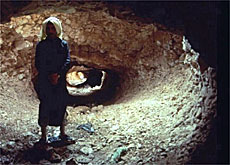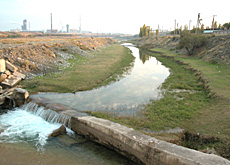Swiss help Syrians revive ancient water system

A Swiss-funded project in Syria is reviving ancient techniques for supplying water to rural communities.
The restoration of “qanats” – underground tunnels that tap groundwater and direct it to towns and agricultural land – offers a sustainable way of managing scarce water resources.
The Swiss Agency for Development and Cooperation (SDC) is backing a project to restore the tunnels in Qara, a town of 20,000 people about an hour outside the capital, Damascus. The Netherlands and Germany are also providing financial support.
As in other countries in the Middle East, this irrigation technique can help solve problems of water scarcity.
“This is a very sustainable system of using groundwater because it doesn’t use mechanical means, and it basically relies on gravity and on the natural flow of water,” said Joshka Wessels, head of the qanat renovation project in Syria.
There are hundreds of miles of qanats throughout the Middle East but many have fallen into disuse in recent years.
3,000 years old
The technology – which is believed to have originated in Iran more than 3,000 years ago – has been largely abandoned in favour of wells and the use of motor pumps to extract water.
But pumping is a short-term solution that creates a long-term problem – the drying up of groundwater due to over-pumping.
As water sources have dried up, many farmers have left Syria’s rural communities, including Qara.
“If there is not enough water people will have to leave for one of the bigger cities,” said Wessels.
Cities such as Damascus and Aleppo have seen their populations explode in recent years as people abandon the countryside in search of a better life.
In Qara a small team works underground to renovate the qanats – which can be several kilometres long and up to 100 metres deep.
Dangerous work
Experts skilled in the ancient technique of qanat maintenance and renovation have been brought in to help with the work.
“The debris has accumulated for a long time and has turned hard like cement,” Wessels said.
After many years of neglect, debris has fallen into the tunnels, the walls have collapsed and soil clogs the flow of water.
Repairing the qanats is dangerous, time-consuming and labour-intensive work.
“It’s not just anyone who can go down and work in a tunnel like this,” said Samer Zeynab, a work supervisor in Qara. “Experience, knowledge and guts are required.”
Better than tap
The workers clear away the debris, reinforce the walls and before long water can flow through the tunnels again before being channelled to farms and orchards.
“This project is really excellent. It couldn’t be better than this. Now the water level is almost twice as high as before,” said Abdel Hakim Zeyn, a farmer from Qara.
“We are just waiting for God’s mercy to send us more rain.”
Besides the farmers, people from the village are also benefiting from the renovation project as they collect water from a qanat reservoir for use in their home.
Wessels says that villagers believe that the water from the qanats is better for drinking than piped water.
“Even though they have their modern taps they still go to the qanat outlet to get their water,” she said.
swissinfo, Karin Kamp in Qara, Syria
Qanats are thought to have originated in Iran 3,000 years ago.
They can be up to several kilometres long and up to 100 metres deep.
There are hundreds of miles of qanats throughout the Arab world.
Switzerland is funding the qanat renovation project in conjunction with Germany and the Netherlands.
A qanat is an underground irrigation system, which brings water to the surface where it can be used for irrigation.
The advantage of qanats is that they provide continuous water flow when operated. Though seasonal fluctuations may occur, the system is reliable for long periods.
Maintaining a qanat – which means tunnel in Arabic – is labour-intensive and dangerous work.
Sometimes young boys work in the narrow tunnels as they can move more easily through the qanats.

In compliance with the JTI standards
More: SWI swissinfo.ch certified by the Journalism Trust Initiative

You can find an overview of ongoing debates with our journalists here. Please join us!
If you want to start a conversation about a topic raised in this article or want to report factual errors, email us at english@swissinfo.ch.